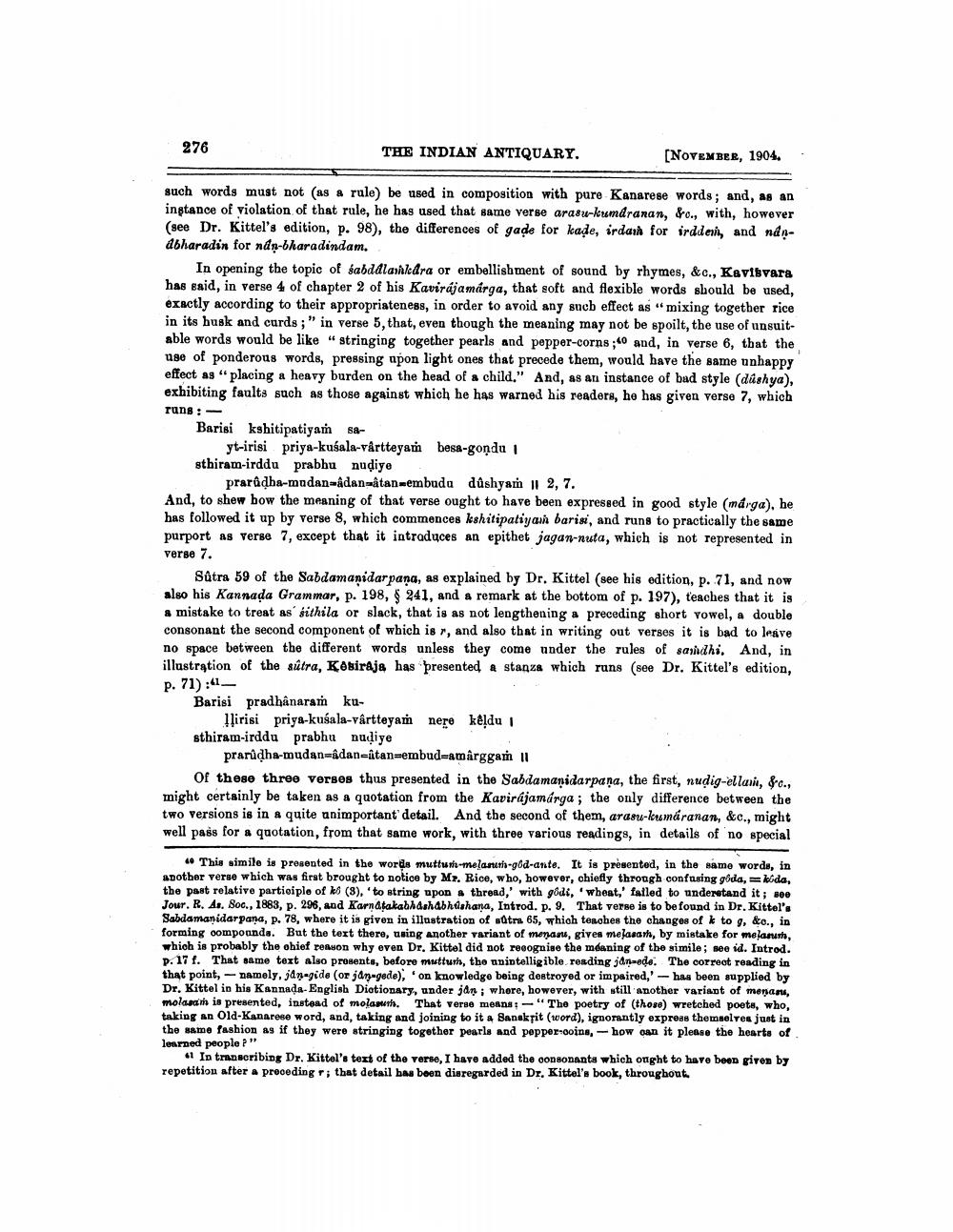________________
276
THE INDIAN ANTIQUARY.
[NOVEMBER, 1904.
such words must not (as a rule) be used in composition with pure Kanarese words; and, as an instance of violation of that rule, he has used that same verse arasu-kumdranan, 80., with, however (see Dr. Kittel's edition, p. 98), the differences of gade for kade, irdard for irdder, and nondbharadin for ndn-bharadindam.
In opening the topic of sabdAlashkara or embellishment of sound by rhymes, &c., Kavisvara has said, in verse 4 of chapter 2 of his Kavirajamárga, that soft and flexible words should be used, exactly according to their appropriateness, in order to avoid any sucb effect as " mixing together rice in its husk and curds;" in verse 5, that, even though the meaning may not be spoilt, the use of unsuitable words would be like " stringing together pearls and pepper-corns ;60 and, in verse 6, that the use of ponderous words, pressing upon light ones that precede them, would have the same unhappy effect as "placing a heavy burden on the head of a child." And, as an instance of bad style (důshya), exhibiting faults such as those against which he has warned his readers, he has given verse 7, which rung: - Barisi kshitipatiyam sa
yt-irisi priya-kusala-vártteyam besa-gondu 1 sthiram-irddu prabhu nudiye
praradha-mudan=&dan åtan-embuda dushyan 112, 7. And, to shew bow the meaning of that verse ought to have been expressed in good style (márga), he has followed it up by verse 8, which commences kshitipatiyash baris, and runs to practically the same purport as verse 7, except that it introduces an epithet jagan-nuta, which is not represented in verse 7.
Sûtra 59 of the Sabdamanidar pana, as explained by Dr. Kittel (see his edition, p. 71, and now also his Kannada Grammar, p. 198, 241, and a remark at the bottom of p. 197), teaches that it is a mistake to treat as sithila or slack, that is as not lengthening a preceding short vowel, a double consonant the second component of which is r, and also that in writing out verses it is bad to leave no space between the different words unless they come under the rules of sandhi, And, in illustration of the aútra, Kobiraja has presented a stanza which runs (see Dr. Kittel's edition, p. 71):41 Barisi pradhanaram ku
llirisi priya-kušala-vârtteyam nere kéļdu sthiram-irddu prabhu nudiye
prarüdha-mudan=adan=îtan=embud-amarggam 11 Of these three verses thus presented in the Sabdamanidarpana, the first, nudig-ella, &c., might certainly be taken as a quotation from the Kavirajamárga; the only difference between the two versions is in a quite animportant detail. And the second of them, arasu-kumaranan, &c., might well pass for a quotation, from that same work, with three various readings, in details of no special
4. This simile is presented in the words muttun-melas -god-ante. It is presented, in the same worde, in another verse which was first brought to notice by Mr. Rice, who, however, chiefly through confusing gôda, kuida, the past relative participle of ks (8), 'to string upon a thread, with godt, wheat,' failed to underetand it; 100 Jour. R. As. Soc., 1883, p. 296, and Karnatakabadshabhdhana, Introd. p. 9. That verse is to be found in Dr. Kittel's Sabdamanidar pana, p. 78, where it is given in illustration of sutra 65, which teaches the changes of k to g, &c., in forming compounds. But the text thero, using another variant of monan, gives melasanh, by mistake for melanin which is probably the ohief reuon why even Dr. Kittel did not recognise the meaning of the simile; see id. Introd. p. 17f. That same text also prosents, before mutturh, the unintelligible reading jannede. The correct reading in that point, - namely, jdn.gide (or jan-gede), on knowledge being destroyed or impaired,' has been supplied by Dr. Kittel in his Kannada English Dictionary, under jan ; whore, however, with still another variant of menani, molasan is presented, instead of molawth. That verse means: "The poetry of those) wretched poeta, who, taking an Old-Kanarose word, and, taking and joining to it a Sanakpit (word), ignorantly express themselves just in the same fashion as if they were stringing together pearls and pepper coins, -how oan it please the hearts of learned people ?"
« In transcribing Dr. Kittel's text of the verse, I have added the consonants which onght to have been given by repetition after a preceding r; that detail bas been disregarded in Dr, Kittel's book, throughout




